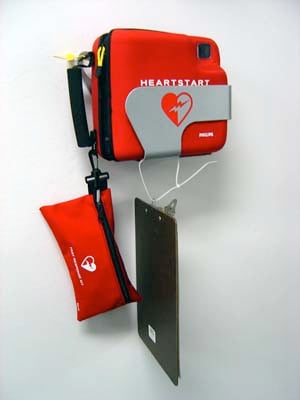
 A new provincial bill undergoing second reading could have a profound effect on the outcomes of cardiac arrest and bystander CPR response in Ontario.
A new provincial bill undergoing second reading could have a profound effect on the outcomes of cardiac arrest and bystander CPR response in Ontario. If passed, Bill 41, The Defibrillator Access Act would be the first of its kind in Canada requiring Automated External Defibrillators (AEDs) be installed in public spaces such as schools, fitness facilities and hockey arenas in the province. The Heart and Stroke Foundation has been advocating for this proposed law since 2006.
“The introduction of Bill 41 has the potential to save countless lives across Ontario," said Ted McMeekin, MPP for Ancaster-Dundas-Flamborough-Westdale, who introduced the private member’s bill. "With greater access to this life-saving tool, public facilities in our communities will be safer places for all of us to gather to lead more active and healthy lives.”
“Less than five per cent of those who experience a cardiac arrest outside of a hospital survive,” says Dr. Marco Di Buono, director for research at the Heart and Stroke Foundation of Ontario. “Right now, this program is voluntary. Think of how many more lives could be saved, if it was mandatory,” says Dr. Di Buono.
Together with government, corporate and community partners, the Heart&Stroke Restart a Heart, Restart a Life program and the Chase McEachern Tribute Fund have installed 2,194 AED units and trained 12,500 people on their use.
(Watch: How the AED saved Joel Scott's life)
To date, the Restart program has helped save 22 lives. These AEDs are placed in conjunction with local Public Access Defibrillator partners (EMS, Fire Departments, Parks and Recreation) in municipalities and First Nations communities in Ontario.
The Heart and Stroke Foundation was also a strong supporter and advocate for the successful passage of The Chase McEachern Act (Heart Defibrillator Civil Liability) 2007, which clarified the liability surrounding the use of an AED. The bill was named after Chase McEachern, an 11-year old boy who advocated for AEDs in public places, before he passed away in 2006 after suffering a cardiac arrest. Bill 41 would be the final piece of ensuring Chase’s dream of seeing AEDs more widely available.
In 2006, the Heart and Stroke Foundation of Ontario started funding the placement of AED units in Ontario and advocating to the government to make these units as common as fire extinguishers.
Each year, approximately 7,000 Ontarians will experience cardiac arrest with up to 85 per cent of cardiac arrests occurring at home or in public places. For every minute that passes without help, a person’s chance of surviving a cardiac arrest drops by 7 to 10 per cent, so having an AED close at hand is imperative.
Research indicates that defibrillation, when used in conjunction with CPR in the first few minutes, can dramatically improve cardiac arrest survival rates by more than 75 per cent.





